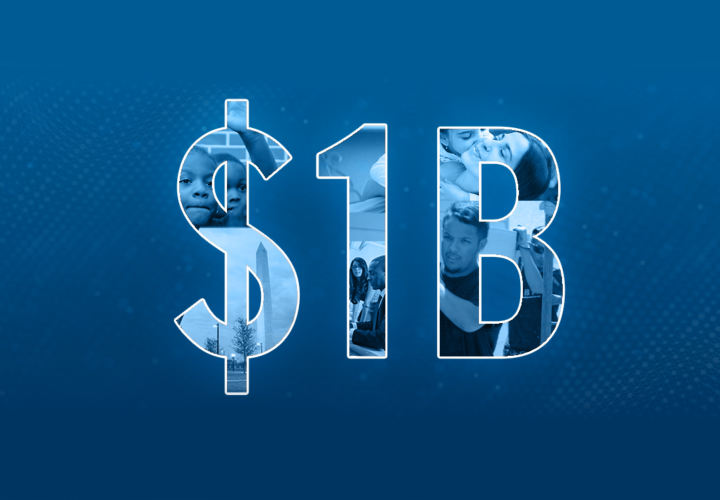Jack Henry Launches MyFinancial Health To Help Its Customers Thrive
How can consumers have more control over their entire financial lives? Jack Henry’s new MyFinancialHealth suite of tools makes that vision a reality for consumers of over 1,000 banks and credit unions.
Why Scam Protection Must Be Part of Financial Health Conversations
Fraud and scams cost Americans billions each year and undermine financial security and trust. Combating this crisis requires cross-sector collaboration, education, and innovative defenses.
New Frontiers in Financial Inclusion
Opportunities revealed in the FDIC’s latest survey could spark fresh ways for banks to reach “last-mile customers”.
What We Can Learn About Wealth Disparities in a Moment of Unprecedented Intergenerational Wealth Transfer
Article #3 in the Series | In the decades ahead, the country is on the precipice of a significant shift in wealth and assets between generations as America’s population ages.
Improving the Underlying Systems That Shape Financial Decisions
Financial decisions are complex and shaped by many factors. When looking to achieve better outcomes for individuals, financial health solutions need to address decision making from all angles.
Increasing Banking Access Through Mobile Branches
With nearly 25 million unbanked or underbanked U.S. households, PNC makes access to banking services more convenient with its innovative mobile banking program.
Empowering Small Businesses: How Section 1071 Can Spark Financial Health for All
Financial decisions are complex and shaped by broader systems. As a result, financial health solutions need to create systems that enable better decision-making.
From Inclusion To Mobility: How CDFIs Use Measurement To Serve Communities
Long considered the “on-ramp” to financial services for underserved communities, many CDFIs are shifting their focus to support financial health.
Mastercard: Empowering Small Businesses With Accessible AI
Through its global initiative, Mastercard Strive is supporting small businesses with innovative AI solutions that would otherwise be difficult to access.
The Future of Work: Adapting to Technological Change and Its Impact on Older Workers
Article #2 in the Series | Older workers are particularly vulnerable to being affected by technological advancements. How can employers help them remain competitive in the workforce?
Prolonged Parenting in an Era of Extended Longevity
Article #1 in the Series | As lifespans evolve, parents’ involvement in their adult children’s lives is changing. Explore the implications of “prolonged parenting” and the shifting financial needs of parents.
Helping Small Business Employers Deliver Financial Inclusion Benefits
Small businesses often struggle to provide the financial inclusion benefits offered by larger employers. What solutions could close the gap for millions of American workers? This article is EMERGE sponsored content presented by Principal Financial Group.
America Needs Small Businesses. Here’s How We Can Help Them Succeed
Small businesses are essential to our economic well-being, but they face common challenges. Learn how the Mastercard Center for Inclusive Growth is building a support ecosystem to help them and fuel an inclusive economic recovery. This article is EMERGE sponsored content presented by Mastercard Center for Inclusive Growth.
Innovating Against Predatory Lending Products
A majority of American payday loan borrowers make less than $30k per year and end up on average paying $520 in fees to borrow $375 over five months. Learn how DailyPay is innovating against predatory lending products. Presented by DailyPay
Prudential Foundation: Using Philanthropy To Drive Racial Equity and Financial Inclusion
How can corporate philanthropy advance racial equity in meaningful ways? Discover how Prudential Foundation is using its latest round of grants to improve financial health and inclusion.
Digital Currencies and Financial Health
Digital currencies have the potential to improve financial health for millions, but it depends on how they are designed and integrated into the financial services infrastructure.
Franklin Madison CFO Talks Insurtech Trends
Learn how the pandemic has transformed consumer perspectives on insurance in this insurtech trend forecast from PYMNTS.com and Franklin Madison Chief Financial Officer Preston Porter. Presented by Franklin Madison
Financial Health Innovation from America’s Youth
Young people in America are channeling their problem-solving abilities into innovative finhealth solutions through Prudential Emerging Visionaries. Presented by Prudential Financial
Why Nonprime and Prime Customers Need Flexibility Post-Pandemic
As a company focused on serving those consumers who may be shut out of traditional borrowing opportunities, Elevate understands that access to safe, affordable credit is as important as ever in enabling Americans to achieve financial security. Presented by Elevate
Making Client Voice Part of the Design Process: Behavioral Insights Elevate Flexibility and Simplicity in Financial Health Tools
Even before the COVID-19 pandemic, many families across America were struggling to make ends meet. But they still have big hopes and dreams today, from getting a car to finding better job opportunities to buying a home. To achieve any of these goals, saving and credit-building are two critical steps toward financial stability and self-determination. And at the current moment of societal upheaval, financial stability is not just nice-to-have, but vital. Presented by Capital One
Driving the Work of Economic Equity in Underserved Communities
While for many people in the U.S., seeing a bank—or several—is a daily occurrence, a lack of access to financial services is unfortunately a familiar story for underserved communities, especially communities of color. Last year, the Cherry Hill neighborhood of South Baltimore celebrated the opening of a 5,000-square-foot Chase bank branch, marking an important milestone: it was the first national bank to ever open in this historically Black community. Presented by JPMorgan Chase & Co.
The Future of Financial Wellness is Taking Shape
As the way we work changes, financial wellness should adapt too. Explore these new ideas that are shaping the future. While the initial thrust into remote work was a crisis response, it is now being embraced by both employees and employers. In fact, many companies plan to maintain remote workforces. Presented by Morgan Stanley at Work
Beyond Messaging: Financial Health Is No Longer a Nice-To-Have
We’ve long known from research and practice about the business case for advancing financial health. The coronavirus escalated the already precarious state of financial health of Americans everywhere and Financial Health Network Members took notice.
The Complexities of Caregiving: Financial Health and the Aging Crisis
Research overwhelmingly shows that health shocks can have dramatic and long-term implications for financial health. This is especially true for the elderly. Among all the statistics, it is clear that there will be more elderly people dependent on fewer younger people with an ever-increasing list of challenges, making financial health for all less attainable.
Start Here: A Step-by-Step Guide to Impact Evaluation
Understanding why you want to conduct impact evaluation is the first step in determining how you should do it.
The Case for a Place-Based Approach to Financial Health
By Necati Celik Associate, Financial Health Network Place is security, space is freedom: we are attached to the one and long for the other. Yi Fu Tuan, 2001: 3 There’s no place like home. Due to the pandemic, home has now become both the workplace and the playground for many of us. But what is…
Motivating Change: Behavioral Economics and Financial Health
By Heidi Johnson Director, Financial Health Network Director Heidi Johnson joined the Financial Health Network team in 2019 to lead our work applying behavioral insights to the design and delivery of financial health products. She comes to our organization from the Consumer Financial Protection Bureau, where she led a behavioral research program and contributed to…
Turning the Tide: Addressing Climate Change and Financial Health
By Eric Wilson Senior Associate, Financial Health Network As a data analyst at the Financial Health Network, I spend a lot of time with our U.S. Financial Health Pulse data set, searching for possible drivers of financial health. So, when combing through survey participants’ descriptions of shocks to their household finances, I found a number…



























